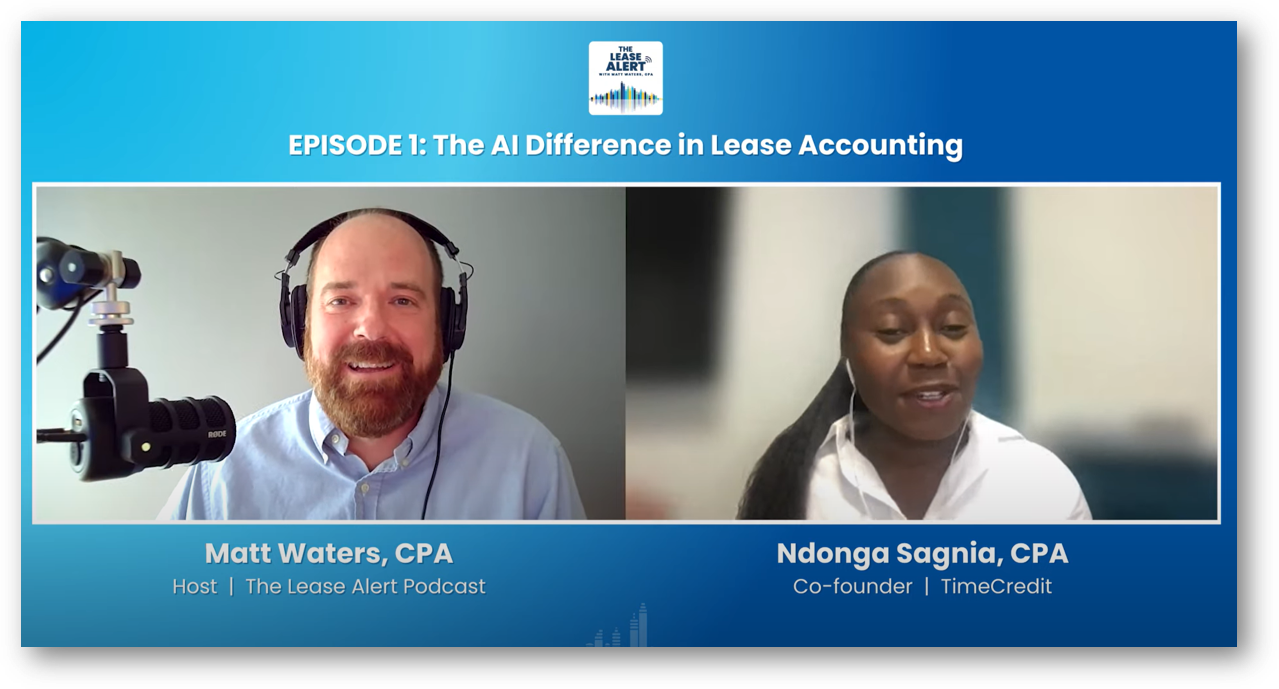Share this
by Laura Richards on March 24, 2025
Does tech equal trust? Yes! According to the 2024 BDO Audit Innovation Survey.
"63% of senior finance leaders say trust is somewhat or significantly enhanced for them and their key stakeholders when auditors use advanced technology, and 64% say they look for a firm to use AI before even engaging with an auditor," reports BDO.
Artificial intelligence is rapidly expanding its reach into different industries and roles. And now, lease accounting teams and their auditors have entered the chat.
As technology advances, its integration into auditing processes is advancing. The survey along with the AICPA (American Institute of Certified Public Accountants) updates show a change in how we use technology. The focus on AI is growing daily. This change aims to improve audit quality, transparency and efficiency.
However, the data also reveals a balanced perspective among finance leaders. While technology can optimize and innovate the audit process, the expertise and judgment of seasoned accounting departments remain indispensable.
Technology's impact on audit quality
More than half of finance leaders (54%) believe that utilizing advanced technologies, like AI, will improve audit quality and financial reporting. Additionally, 64% of respondents now seek audit firms that already use AI, viewing it as a competitive advantage in lease management.
The benefits of integrating technology into audits are substantial. Leaders cite greater process efficiency (52%) and enhanced transparency (46%) as some of the top anticipated benefits.
The AICPA recently approved updates to its peer review standards. This signals an industry-wide acknowledgment of the importance of technological alignment and rigor in audit practices. These updates, along with new resources for quality management, give firms clear guidelines. They can use technology to improve audit and financial statement quality.
The human element in auditing
Despite the technological transformation, finance leaders remain steadfast in their demand for experienced auditors. The survey shows that 56% of people prioritize a proven track record when choosing an audit firm.
Additionally, 49% value an auditor’s knowledge of their specific industry when managing accounts. Skilled professionals are essential for understanding and using the results from advanced tools. This is key to keeping audit quality and trust.
Technology enhances the audit process, but seasoned auditors provide the contextual understanding that makes data-driven insights valuable. With their expertise, they can interpret AI insights accurately. And, most importantly, these auditors ensure that nuanced industry details are not missed in an automated process.
Addressing data challenges and building trust
A strong data foundation is critical for successful technology adoption in audits, but establishing data governance remains a challenge. In the BDO survey, 69% of finance leaders said data governance is a significant obstacle to a smooth audit. Other challenges include resource constraints (60%) and the difficulties of compiling and preparing audit evidence (56%).
These challenges highlight the need for proper data management protocols before adopting complex technologies. If you don't have a strong data foundation, new tools may not work effectively. This includes ETL software, robotic process automation, and augmented reality.
Good data governance can unlock the full potential of these tools. It improves transparency and builds trust between finance teams and auditors while ensuring compliance.
Leveraging AI to address talent shortages
The accounting talent shortage is an ongoing challenge, and AI is proving to be a valuable tool to address this gap in real time. Nearly 61% of finance leaders are turning to AI to address inefficiencies.
- 68% focus on recruiting experienced accountants.
- 50% consider hiring non-accountants, such as data scientists, to fill essential roles.
AI tools in data entry, predictive analytics and expense management help finance professionals focus on important tasks. This lets them use their skills for strategic work and informed decision making rather than busy work dominating their day to day.
By implementing AI in these ways, finance teams can alleviate the strain caused by the talent shortage. They can now ensure that critical auditing functions are maintained even as the demand for experienced professionals continues to outstrip supply.

Want more tips for growing your accounting team?
ESG Reporting Will Boost the Accounting Profession
Preparing for the future of audit
As the auditing landscape evolves, finance leaders and audit firms alike are re-evaluating their priorities and strategies. The new peer review standards from AICPA and advances in AI will improve the audit profession. These changes will enhance quality, transparency and trust while maintaining compliance with ASC 842 and IFRS 16.
However, the human element remains critical. Technology may revolutionize the way auditors conduct their work. But the expertise, judgment and industry knowledge of experienced auditors will continue to be essential.
The best lease accounting software for an AI future
When accounting teams are preparing for audit, there are a lot of steps. They must produce lease accounting disclosure, roll-forward, reconciliation and ad hoc reports in response to audit requests.
Instead of taking minutes or hours, CoStar Real Estate Manager provides everything with just one click. They also include all the lease-level details that auditors need. This helps ensure the total amounts in reports are accurate.
Give the auditors exactly what they need
The importance of lease accounting audit details in reports
Companies that can effectively blend the power of advanced technologies with skilled audit professionals will likely stand out. They will set the standard for an auditing process that is as thorough and insightful as it is efficient. By focusing on alignment, trust and data maturity, finance leaders and auditors can enjoy the best of both worlds. This is how they'll meet the needs of a modern, dynamic business environment.
Share this
- Lease Accounting Software (90)
- ASC 842 (83)
- Accounting Teams (53)
- Lease Administration Software (27)
- Retail Tenants (16)
- Commercial Real Estate (14)
- Lease Management (13)
- Real Estate Teams (10)
- ESG (8)
- Market Data and Analytics (8)
- Success Stories (8)
- News and Media Coverage (5)
- Transaction Management Software (2)
- frs 102 (2)
- Customer Success (1)
- Healthcare real estate (1)
- Office Tenants (1)
- December 2025 (1)
- September 2025 (1)
- July 2025 (2)
- June 2025 (4)
- May 2025 (2)
- April 2025 (2)
- March 2025 (6)
- February 2025 (3)
- January 2025 (4)
- December 2024 (1)
- October 2024 (4)
- September 2024 (2)
- August 2024 (4)
- July 2024 (3)
- June 2024 (3)
- May 2024 (4)
- April 2024 (1)
- February 2024 (1)
- December 2023 (4)
- November 2023 (6)
- October 2023 (4)
- September 2023 (2)
- August 2023 (2)
- July 2023 (3)
- May 2023 (2)
- March 2023 (1)
- February 2023 (3)
- January 2023 (1)
- December 2022 (3)
- November 2022 (4)
- October 2022 (4)
- September 2022 (1)
- August 2022 (4)
- June 2022 (1)
- May 2022 (4)
- April 2022 (8)
- March 2022 (3)
- February 2022 (1)
- January 2022 (2)
- November 2021 (2)
- October 2021 (2)
- September 2021 (3)
- August 2021 (15)
- July 2021 (3)
- June 2021 (1)
- May 2021 (1)
- April 2021 (3)
- March 2021 (1)
- January 2021 (1)
- December 2020 (3)
- November 2020 (1)
- October 2020 (2)
- September 2020 (2)
- August 2020 (3)
- July 2020 (2)
- June 2020 (3)
- May 2020 (1)
- April 2020 (1)
- March 2020 (1)
- February 2020 (1)
- December 2019 (1)
- October 2019 (1)
- September 2019 (2)
- August 2019 (3)
- July 2019 (2)
- April 2019 (69)
- October 2018 (1)
- August 2018 (1)
- July 2018 (1)
- June 2018 (1)
- May 2018 (1)
- April 2018 (2)
- March 2018 (3)
- February 2018 (2)
- December 2017 (1)
- August 2017 (3)
- June 2017 (2)
- May 2017 (2)
- April 2017 (1)
- March 2017 (2)
- January 2017 (2)
- November 2016 (2)
- July 2016 (1)
- June 2016 (1)
- July 2015 (1)
- March 2015 (1)
- June 2014 (1)
- April 2014 (11)
- October 2011 (1)
You May Also Like
These Related Stories
.png)
CoStar REM Integrations for Lease Accounting, Payments, and Reporting

The AI Difference in Lease Accounting



